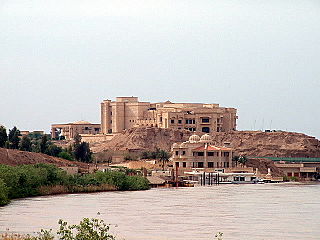
Ansar al-Islam in Kurdistan, simply called Ansar al-Islam, is a Kurdish Islamist militant and separatist group. It was established in northern Iraq around the Kurdistan Region by Kurdish Islamists who were former Taliban and former Al-Qaeda volunteers, which were coming back from Afghanistan in 2001 after the Fall of Kabul. Its motive is to establish an Islamic state around the Kurdistan region and to protect Kurdish people from other armed insurgent groups. It imposed strict Sharia in villages it controlled around Byara near the Iranian border.

Tikrit is a city in Iraq, located 140 kilometers (87 mi) northwest of Baghdad and 220 kilometers (140 mi) southeast of Mosul on the Tigris River. It is the administrative center of the Saladin Governorate. As of 2012, it had a population of approximately 160,000.

Jama'at al-Tawhid wal-Jihad, abbreviated as JTJ or Jama'at, was a Salafi jihadist militant group. It was founded in Jordan in 1999, and was led by Jordanian national Abu Musab al-Zarqawi for the entirety of its existence. During the Iraqi insurgency (2003–11), the group became a decentralized network with foreign fighters with a considerable Iraqi membership.

A caliphate or khilāfah is an institution or public office under the leadership of an Islamic steward with the title of caliph, a person considered a political-religious successor to the Islamic prophet Muhammad and a leader of the entire Muslim world (ummah). Historically, the caliphates were polities based on Islam which developed into multi-ethnic trans-national empires. During the medieval period, three major caliphates succeeded each other: the Rashidun Caliphate (632–661), the Umayyad Caliphate (661–750), and the Abbasid Caliphate (750–1517). In the fourth major caliphate, the Ottoman Caliphate, the rulers of the Ottoman Empire claimed caliphal authority from 1517 until the caliphate was formally abolished as part of the 1924 secularisation of Turkey. Throughout the history of Islam, a few other Muslim states, almost all of which were hereditary monarchies such as the Mamluk Sultanate (Cairo) and Ayyubid Caliphate, have claimed to be caliphates.
The Saqifa of the Banu Sa'ida clan refers to the location of an event in early Islam where some of the companions of the Islamic prophet Muhammad pledged their allegiance to Abu Bakr as the first caliph and successor to Muhammad shortly after his death in 11 AH. The Saqifa meeting is among the most controversial events in early Islam, due to the exclusion of a large number of Muhammad's companions, including his immediate family and notably Ali, his cousin and son-in-law. The conflicts that arose soon after Muhammad's death are considered to be the main cause of the current division among Muslims. Those who accepted Abu Bakr's caliphate were later labeled Sunnis, while the supporters of Ali's right to caliphate were later labeled Shia.

The Mujahideen Shura Council, was an umbrella organization of at least six Sunni Islamist insurgent groups taking part in the Iraqi insurgency against U.S.-led Coalition and Iraqi forces. The groups included in the MSC were: Tanzim Qaidat al-Jihad fi Bilad al-Rafidayn, Jaish al-Ta'ifa al-Mansurah, Katbiyan Ansar Al-Tawhid wal Sunnah, Saraya al-Jihad Group, al-Ghuraba Brigades, and al-Ahwal Brigades. In mid-October 2006, a statement was released, stating that the Mujahideen Shura Council had been disbanded, and was replaced by the Islamic State of Iraq.

Abu Omar al-Baghdadi, born Hamid Dawud Muhamed Khalil al-Zawi was the Emir of the Islamic militant umbrella organization Mujahideen Shura Council (MSC), and its successor, the Islamic State of Iraq (ISI), which fought against the U.S.-led Coalition forces during the Iraqi insurgency.
Osbat al-Ansar or Asbat an-Ansar is a Sunni fundamentalist group established in the early 1990s, with a primary base of operations in the Palestinian camp of Ain al-Hilweh refugee camp near Sidon, which claims professing the Salafi form of Islam and the overthrow of the Lebanese-dominated secular government.

Tanzim Qaidat al-Jihad fi Bilad al-Rafidayn, more commonly known as Al-Qaeda in Iraq, was a Salafi jihadist organization affiliated with Al-Qaeda. It was founded on 17 October 2004, and was led by Abu Musab al-Zarqawi and Abu Ayyub al-Masri until its disbandment on 15 October 2006.
The Islamic Army–Al-Qaeda Conflict was part of the Iraqi civil war (2006–2008) and the Iraq War that followed the 2003 invasion of Iraq. The conflict was between Pan-Islamist, Salafi jihadist groups affiliated with Al-Qaeda, and Islamist groups made up of Iraqis which leaned more towards Iraqi nationalism and often disagreed with Al-Qaeda's ambitions.

Ansar al-Sharia in Tunisia is a Salafi Jihadist group that operates in Tunisia. In 2013, the group was estimated to have roughly 10,000 members. It has been listed as a terrorist group by the Tunisian government as well by Iraq, the United Nations, the UAE, the United Kingdom and the United States. Some of its members may be linked to the 2015 Sousse attacks. In 2013, the group declared loyalty to Al-Qaeda.

Ansar al-Sharia in Libya was an Al-Qaeda-aligned Salafi Jihadist militia group that advocated the implementation of Sharia law across Libya. Ansar al-Sharia came into being in 2011, during the Libyan Civil War. Until January 2015, it was led by its "Amir", Muhammad al-Zahawi. As part of its strategy, the organization targeted specific Libyan and American civilians for death and took part in the 2012 Benghazi attack. The group was designated as a terrorist organization by the United Nations, Iraq, Turkey, the United Arab Emirates, the United Kingdom and the United States.

Ansar al-Sharia is the Derna based branch of a larger Libyan group; the branch is headed by Abu Sufian bin Qumu. In 2011 bin Qumu became the leader of a band of fighters in his hometown of Derna during the 2011 Libyan civil war. The group was reported as disbanding itself following the U.S. Consulate attack in Benghazi however by late 2013 the group had re-emerged in the city as a branch of the Benghazi-based Ansar al-Sharia under the slogan "A step toward building the Islamic state".

The Mujahideen Shura Council in the Environs of Jerusalem or simply the Mujahideen Shura Council is an armed Salafi jihadist group linked to al-Qaeda that is active in Egypt's Sinai Peninsula and in the Gaza Strip. The group was formed in 2011 or 2012 by Salafist Islamist Hisham Al-Saedni to coordinate the activities of the Salafi jihadist groups operating in Gaza even before the Egyptian Revolution of 2011 and has carried out attacks against civilians in Israel. The group describes violence against Jews as a religious obligation that brings its perpetrators closer to God. Al-Saedni, who was the leader of the group and also of Jahafil Al-Tawhid Wal-Jihad fi Filastin, was killed in an Israeli airstrike in Gaza on 14 October 2012. The group is subordinated with Al-Qaeda in Sinai Peninsula as of August 2012.

The Islamic State of Iraq was a Salafi jihadist militant organization that fought the forces of the U.S.-led coalition during the Iraqi insurgency. The organization aimed to overthrow the Iraqi federal government and establish an Islamic state in Iraq.

Abd al-Rahman Mustafa al-Qaduli, better known as Abu Ali al-Anbari, was the governor for territories held by the Islamic State of Iraq and the Levant (ISIL) in Syria. Considered the ISIL second-in-command, he was viewed as a potential successor of ISIL leader Abu Bakr al-Baghdadi.

The Popular Mobilization Forces (PMF), also known as the People's Mobilization Committee (PMC) and the Popular Mobilization Units (PMU), is an Iraqi state-sponsored umbrella organization composed of approximately 67 different armed factions, with around 230,000 fighters that are mostly Shia Muslim groups, but also include Sunni Muslim, Christian, and Yazidi groups. The Popular Mobilization Units as a group was formed in 2014 and have fought in nearly every major battle against ISIL. Many of its main militias, in particular the Shias, trace their origins to the "Special Groups", Iranian-sponsored Shi'ite groups which previously fought an insurgency against the United States and the Coalition forces, as well as a sectarian conflict against Sunni Jihadist and Ba'athist insurgents. It has been called the new Iraqi Republican Guard after it was fully reorganized in early 2018 by its then–Commander in Chief Haider al-Abadi, Prime Minister of Iraq from 2014 to 2018, who issued "regulations to adapt the situation of the Popular Mobilization fighters".
Ali Aswad al-Jiburi, better known by his nom de guerre as Abu Ayman al-Iraqi, was an ISIL commander and Shura council member killed on 18 May 2016 by an airstrike in northern Iraq.
Abu al-Hasan al-Hashimi al-Qurashi, probably born Nour Karim al-Mutni Al-Obaidi Al-Rifai, was an Iraqi militant and the third caliph of the Islamic State. He was named as caliph on 10 March 2022, in an audio message by the new spokesperson of IS, Abu Umar al-Muhajir, whose announcement came more than a month after the death of his predecessor Abu Ibrahim al-Hashimi al-Qurashi. The message said that Abu al-Hassan was given a pledge of allegiance in response to the will of the former caliph. The Turkish government claimed that he was arrested in Istanbul on 26 May 2022. Later, Islamic State sources denied news reports of his arrest in the 347th issue of their weekly newsletter Al-Naba.
Jaysh Ahl al-Sunnah wa-l-Jamaah was an Iraqi Salafi insurgent group that fought against US troops and their local allies during the Iraq War. In 2006 the group aligned itself with al-Qaeda and helped establish the Mujahideen Shura Council.












